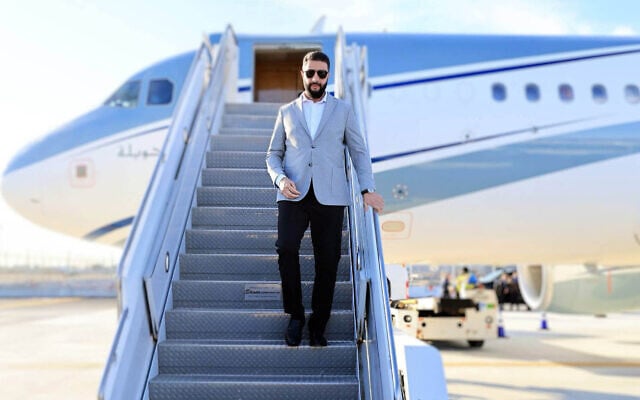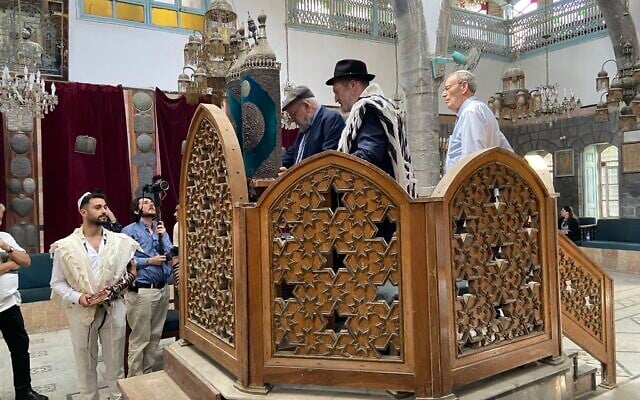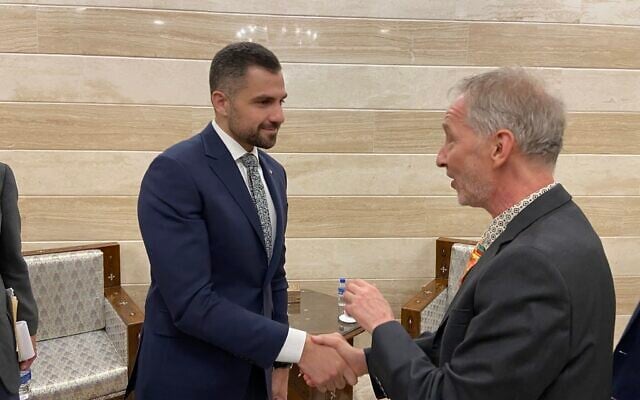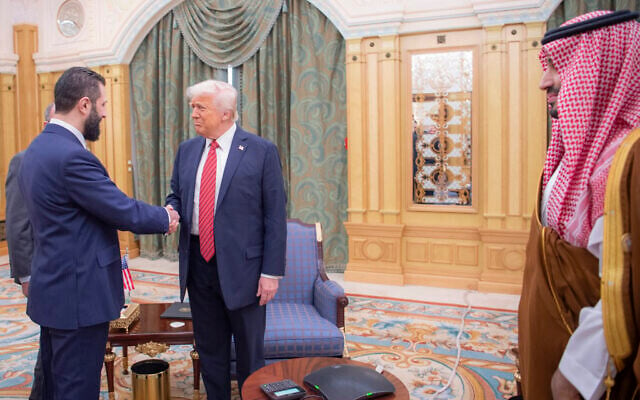

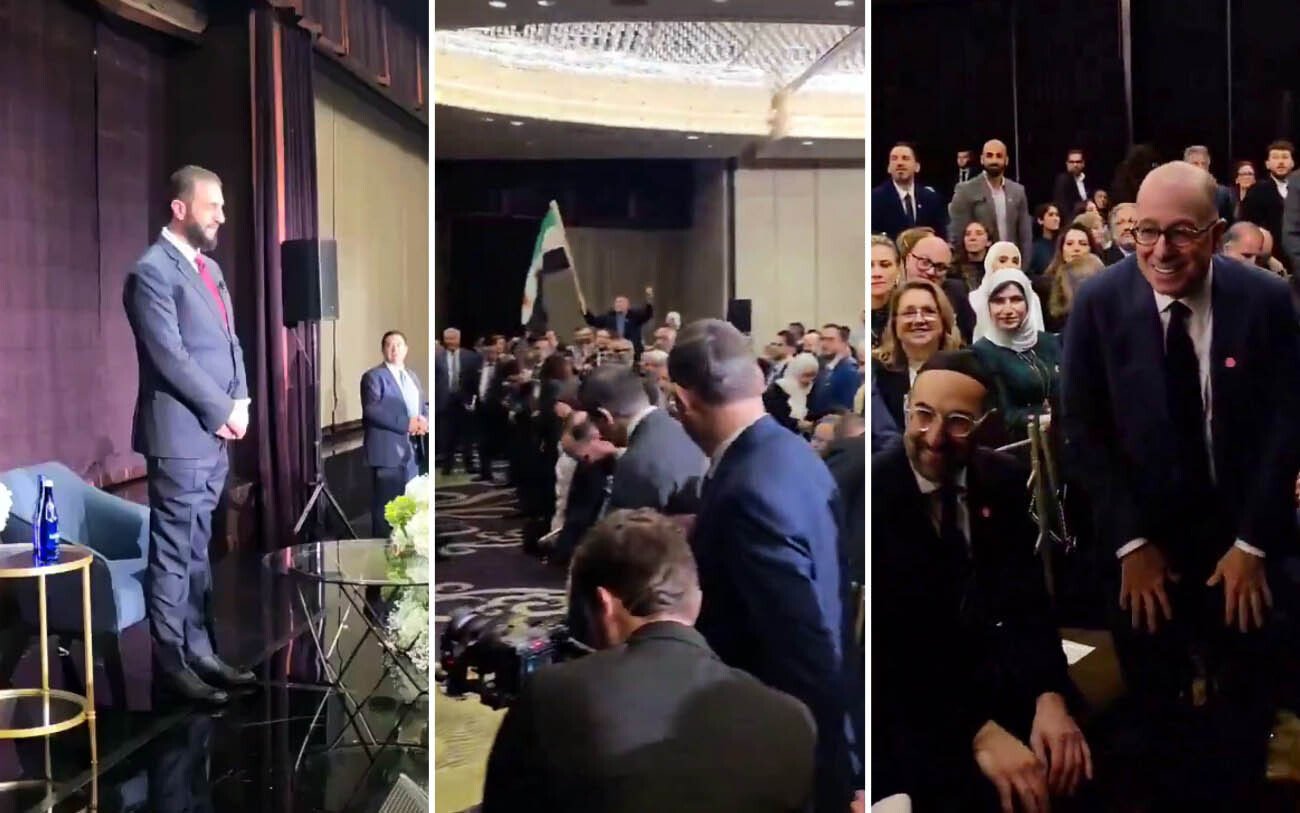
Eleven members of the Syrian Jewish community in New York attended a meeting with Syrian President Ahmed al-Sharaa on Sunday night, along with hundreds of other US-based Syrians who came to the event at the invitation of Sharaa’s officials.
Sharaa is in New York to address the United Nations General Assembly on Wednesday, becoming the first Syrian leader in six decades to speak at the UNGA.
Joe Jajati, a Syrian-born Jewish businessman who attended Sunday night’s event at the Mandarin Hotel, told The Times of Israel that the meeting was “very emotional and inspiring.”
He said the Syrian president welcomed everybody, “including the Jews, very nicely,” and left a very good impression.
Sharaa was ecstatically welcomed by the crowd in the room, with extended applause and cheering.
Jajati said Israel was not discussed at the meeting, and that nobody met with Sharaa personally. He did not know how the 11 Jewish participants had been selected, but said the invitation came from the Syrian Foreign Ministry.
Jajati told the Ynet news site that “Two kippa-wearing Jews stood up to speak [at the event], and said they were proud Jews. One of them, David Shelly, even offered to donate $100,000 to help rebuild Syria. The president laughed and said it wasn’t enough, but you could see on his face how moved he was by the gesture.”
“The Syrian foreign minister [Asaad Al-Shaibani], who was sitting next to him, was also very happy. They don’t need money, but it excited them to see this support,” he said.
Sharaa had said on Wednesday that ongoing negotiations with Israel to reach a security pact could lead to results “in the coming days,” while Prime Minister Benjamin Netanyahu said on Sunday that “certain progress” had been made in talks on the security deal, and a US official told The Times of Israel that the agreement was “99 percent done” and a final deal was expected in the next two weeks.
“We are feeling more optimistic,” Jajati told The Times of Israel, “especially with what’s going to happen in the next few days.”
Jajati helped organize last week’s visit to Syria by a nine-member Jewish group that included The Times of Israel’s editor, David Horovitz.
The group met with several ministers and government officials, visited several Jewish sites, and was given rare access to the Dura-Europos wall paintings at the Damascus National Museum, the world’s earliest surviving series of figurative paintings showing Old Testament events.
During the visit, Qutaiba Idlbi, the director of American Affairs at the Foreign Affairs Ministry, accused Netanyahu of trying to utilize this summer’s deadly fighting in Sweida “to create another war,” and charged that the prime minister appears to want a situation in the south — near the Israeli border — where the Syrian government cannot exercise control.
This was a mistake from Israel’s point of view, Idlbi argued. “We were lucky that we were able to push Iran and Hezbollah out of Syria on December 8… But Iran is ready to step in,” he warned. “Hezbollah is ready to step in.” And thus, Netanyahu risks “creating the seeds for the next confrontation… Anyone who is realistic enough can see that a stable Syria is actually in the interest first and foremost of Israel.”
Sharaa is a veteran jihadist who, until last December, had a $10 million US bounty on his head for terrorism, and whose rebel forces ousted the regime of Bashar al-Assad on December 8, 2024.
In an interview with CBS’s “60 Minutes” ahead of his US trip, Sharaa praised US President Donald Trump for his “quick, courageous and historic decision” to lift sanctions on Syria after they met in Saudi Arabia in May, and said he hoped to meet with Trump again in the US.
In excerpts from the interview published Sunday, it was put to Sharaa that while some see him as a pragmatist, “other skeptics say that you change to meet what you need to be in that moment… Are you saying that you are just a completely changed man?”
He responded: “Let’s look at what’s happening now, regardless of what was said in the media. Today, we have really saved the people from the oppression that was being thrust on them by the criminal regime. And we have restored hope for the people who are refugees or internally displaced, so they can return to their homeland.”
“We supported the people who were bombed with chemical weapons. We also confronted ISIS. We expelled the Iranian militias and Hezbollah from the region. All of these noble acts we took in Syria should have been the role of the international community… The international community failed to deter the regime from using chemical weapons. So I don’t believe we should be standing accused… We should be the one asking others, Why did you stand silent as these terrible crimes were taking place in Syria?”
Sharaa added: “I believe the world must not be complicit again in the killing of the Syrian people by slowing down or preventing the lifting of sanctions and preventing them from reconstructing their nation. Anybody who stands against the lifting of sanctions would be complicit in killing the Syrian people once again.”


